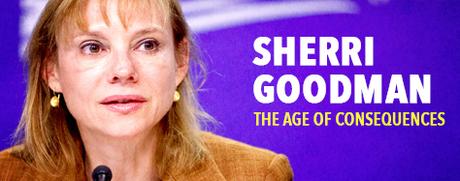Gr: The U. S. military takes the “threat multiplier” effect of climate change very seriously. Here’s why.
 “The Age of Consequences” Climate Film and Speaking Tour
“The Age of Consequences” Climate Film and Speaking Tour
“The Buzzfeed story lead says it all: “Meet the woman whose two-word catchphrase made the military care about climate” . That woman is Sherri Goodman, and she will be in Australia in early April. And the film about climate change and the military will be on ABC TV’s 4 Corners next Monday night.
“The national security dimension of climate change receives little attention in Australia, but is the subject of intense focus overseas, particularly in the United States. Climate change interacts with other pre-existing problems to become an accelerant to instability in unexpected ways. Scarce resources, growing water scarcity, declining crop yields, rising food prices, extreme weather events and health impacts become catalysts for instability and conflict, especially in Asia. This has profound implications for Australia, economically and socially, quite apart from the climate change impact on Australia itself.
“The Age of Consequences” on 4 Corners
“You are unlikely to ever see another climate film like “The Age of Consequences”, so tune into 4 Corners at 8.30pm on Monday night, and find out how the US military really see the challenges of global warming. And yes, they really do get it. A lot better than most politicians.
SCREENING DETAILS: “The Age of Consequences”, from PBS International, directed by Jared P Scott and presented by Sarah Ferguson, goes to air on Monday 20 March at 8.30pm EDT. Replayed on Tuesday 21 March at 10.00am and Wednesday 22 at 11pm. It can also be seen on ABC News 24 on Saturday at 8pm, and at ABC iview.
“This striking documentary investigates the accelerating impact of climate change on increased resource scarcity, migration, and conflict through the lens of US national security and global stability. Through unflinching case-study analysis, distinguished admirals, generals and military veterans take us beyond the headlines of the conflict in Syria, the social unrest of the Arab Spring, the rise of radicalized groups like ISIS, and the European refugee crisis – and lay bare how climate change interacts with societal tensions, sparking conflict. Whether long-term vulnerabilities or sudden shocks, the film unpacks how water and food shortages, drought, extreme weather, and sea-level rise function as “accelerants of instability” and “catalysts for conflict” in volatile regions of the world.
“Age of Consequences” Speaking Tour
“Sherri Goodman will be touring Australia in the first week of April. As well as meeting with government, business, and national security think-tanks, and extensive media engagement, Ms Goodman will be speaking at three public events (use the “Continue reading” link below to get event details).
“Sherri Goodman is a former Deputy Undersecretary of Defense for Environmental Security. From 2001-2015, she served as Senior Vice President and General Counsel of CNA, a non-profit research body that provides analyses and solutions for national security leaders. Sherri is also the Founder and Executive Director of the CNA Military Advisory Board whose landmark reports include “National Security and the Threat of Climate Change” (2007), and “National Security and the Accelerating Risks of Climate Change” (2014).
Climate Threat-Multiplier Events We Cannot Ignore
“So what will you learn from “The Age of Consequences” and Sherri Goodman? Here are a few starters:
“ARAB SPRING: Per capita, the world’s top nine wheat importers are in the Middle East and North Africa. In 2010, a heatwave and wild fires in Ukraine and Russia, and a “once-in-a-century” winter drought in China, resulted in wheat shortages and a global wheat price spike, with rocketing bread prices across the Middle East. Food riots resulted in countries such as Egypt, where basic food costs are one-third of household budget, and became a trigger for the “Arab Spring”.
“SYRIA: From 2006-2010, sixty per cent of Syria had its worst long-term drought and crop failures since civilization began. 800,000 people in rural areas had lost their livelihood by 2009. Two-to-three million people were driven into extreme poverty, and 1.5 million people migrated to Syrian cities, which had already received a similar number of Iraqi war refugees. The cities grew very rapidly, as did food and apartment prices. The resultant social breakdown, state failure, and the rise of Islamic State was a reaction to a regime unable to adequately respond, but global and regional climatic changes were major underlying causes.
“EUROPEAN MIGRATION CRISIS: The European migration crisis is an example of reciprocal interactions between intersecting crisis becoming an accelerant to instability in unexpected ways, with the intersection of: the wars in Iraq and Afghanistan and displacement; the civil war in Syria; the Arab Spring and displacement across the Maghreb; and drought and desertification, war and displacement across the Sahel.
“BANGLADESH: Bangladesh is the ground zero of climate change. A one-metre sea level rise will flood 20% of the land mass and displace 30 million people. India has surrounded Bangladesh with a double security “climate refugee” fence patrolled by 80,000 troops.
“This is a world we ignore at our peril.” –Climate Code Red (Continue reading: Climate Code Red: Meet Sherri Goodman, who in two words made the military care about climate change.)
 “The Age of Consequences” Climate Film and Speaking Tour
“The Age of Consequences” Climate Film and Speaking Tour
